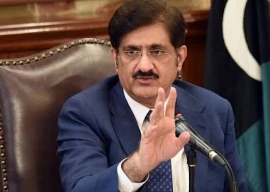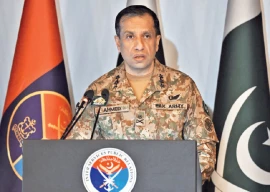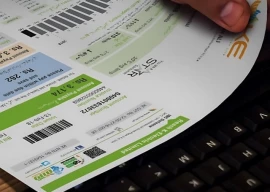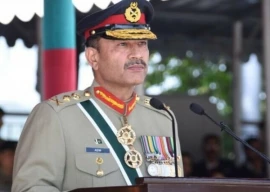
Earlier, Ukraine renounced its bomb-grade uranium on Monday in a boost for President Barack Obama’s summit on securing the world’s nuclear materials, as a US official warned of the ‘growing’ risk of nuclear terrorism.
Obama organised the 47-nation summit in Washington, the biggest hosted by a US leader since 1945, with the aim of securing loose materials in military and civilian stockpiles worldwide within four years.
The gesture from ex-Soviet republic Ukraine, site of the horrific 1986 Chernobyl nuclear power plant explosion, gave early impetus to the summit.
Newly inaugurated President Viktor Yanukovych told Obama in a bilateral meeting that he would give up 90 kilos (180 pounds) of Ukraine’s highly enriched uranium, the equivalent of several bombs, the White House said. But Obama’s top terrorism advisor John Brennan warned that Al-Qaeda’s interest in nuclear weapons was ’strong’ and he warned the risk of nuclear terrorism was ‘real,’ ’serious’ and ‘growing.’
Leaders from China, India, Pakistan, Russia and dozens of other countries converged on a heavily guarded conference center for the two-day meeting.
The goal is to make sure that worldwide stocks of separated plutonium and enriched uranium are destroyed or accounted for and therefore unable to fall into the hands of militant groups.
Following Ukraine’s pledge, Canada made a similar promise on its own smaller stockpile, as had Chile earlier. On Tuesday, the United States and Russia were also to sign an accord on tidying up plutonium reserves.
The deal spells out elimination of the countries’ excess plutonium stores — enough “for several thousand nuclear weapons,” according to the State Department.
Overshadowing the conference was growing tension on Iran, which the United States and its allies accuse of covertly working on a nuclear weapon.
Iran says it is pursuing only civilian power. Obama and Chinese President Hu Jintao agreed their delegations would work together at the United Nations on a US-led push to impose sanctions against Iran, a US official said.
“They are prepared to work with us,” said Jeff Bader, Obama’s top official responsible for East Asia on the National Security Council.
“The two presidents agreed the two delegations should work together on sanctions,” Bader said. Separately, Obama also used his meeting with Hu to urge China to adopt a more “market-oriented” exchange rate for the Chinese yuan, a senior US official said.
North Korea, which defied international pressure to produce a nuclear weapon, was also likely to loom over the summit. Neither the leaders of North Korea or Iran attended.
Iran’s envoy to the UN nuclear watchdog, Ali Asghar Soltanieh, accused Washington of being the “real” threat to global peace given its large nuclear arsenal.
“The outcome of the Washington conference is already known. Any decision taken at the meeting is not binding on those countries who are not represented at the conference,” Soltanieh told ISNA news agency.
Another notable absentee from Washington was Israeli Prime Minister Benjamin Netanyahu who dropped plans to attend, reportedly because of concern that Islamic states planned to press for Israel to open its own nuclear facilities to international inspection.
Illustrating the dividing lines in the flashpoint Middle East, Egyptian Foreign Minister Ahmed Abul Gheit said he hoped sanctions could be avoided against Iran, but that Israel should be pressured over its refusal to join the nuclear Non-Proliferation Treaty.
Obama told reporters that his consultations so far with world leaders had been “impressive.”
“I think it’s an indication of how deeply concerned everybody should be with the possibilities of nuclear traffic. “I think at the end of this we’re going to see some very specific, concrete actions that each nation is taking that will make the world a little bit safer.”
Ahead of the summit on Sunday he branded attempts by non-state groups to obtain nuclear devices “the biggest threat to US security, both short-term, medium-term and long-term.”
“This is something that could change the security landscape of this country and around the world for years to come,” Obama said Sunday.
French President Nicolas Sarkozy agreed that keeping fissile material out of the hands of extremist groups was vital, but said he could not abandon his own nation’s nuclear weapons program “on a unilateral basis, in a world as dangerous as the one in which we live today.”
“I have inherited the legacy of the efforts made by my predecessors to build up France as a nuclear power. And I could not give up nuclear weapons if I wasn’t sure the world was a stable and safe place,” Sarkozy told CBS News in Washington.
1736942026-0/fizza-(33)1736942026-0-405x300.webp)

1736941045-0/fizza-(32)1736941045-0-165x106.webp)
1736940015-0/BeFunky-collage-(53)1736940015-0-165x106.webp)


1736941269-0/sidra--(9)1736941269-0-270x192.webp)




1732012115-0/Untitled-design-(14)1732012115-0-270x192.webp)
1736844405-0/Express-Tribune-(2)1736844405-0-270x192.webp)










COMMENTS
Comments are moderated and generally will be posted if they are on-topic and not abusive.
For more information, please see our Comments FAQ